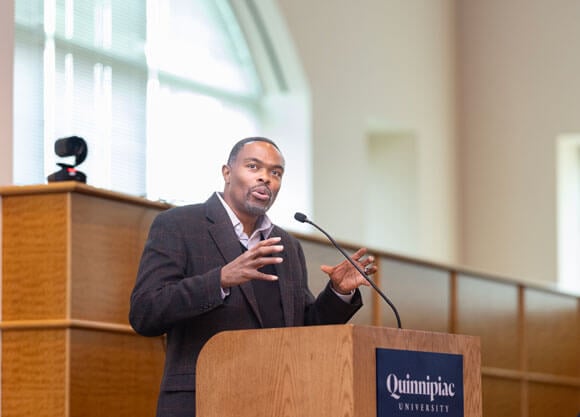
Ronald L. Jackson II engages Quinnipiac community at inaugural ‘Critical Conversations’ event
November 30, 2023

November 30, 2023

Jackson’s discussion explored the tensions and sociopolitical considerations associated with markers of difference. He challenged the Quinnipiac community to consider new strategies for building community, and sustaining a positive, respectful, and progressive discourse.
Jackson is distinguished university research professor of communication and former dean of the college of arts and sciences at the University of Cincinnati. He has also been appointed as a distinguished visiting professor at University of Graz (Austria) and is past president of the National Communication Association. Jackson is an international communication association fellow and national communication association distinguished scholar. An award-winning author, Jackson has produced more than 85 publications related to the study of masculinity, identity negotiation, race and culture.
Wayne Gersie, vice president for equity and inclusion at Quinnipiac, said the university was honored to invite Jackson as the first of several “Critical Conversations” speakers planned for the academic year.
“We hope to foster inclusivity of thought, respectful dialogue, empathetic engagement and open-mindedness among students, faculty and staff. We carefully curated this lineup of speakers who will contribute to the realization of these aspirations as they align with our values here at Quinnipiac,” said Gersie.
Jackson thanked series organizers, faculty, staff and administrators for helping to initiate “the clarion call to redouble the commitment to inclusive excellence here at Quinnipiac University.”
In his discussion, Jackson said beginning to build inclusive community, and aspiring to model inclusive excellence, first requires some understanding of difference and the healing of traumas. He said he was inspired by what President Judy Olian indicated in her convocation speech.
He said the speech recognized that many universities are grappling with how to have difficult conversations across difference, acknowledged the challenges of expressing views that are different than those held by others; and cautioned that without respectful discourse, situations may spiral out of control, possibly giving rise to misguided policies and practices.
“I think she's spot on,” said Jackson. “I also think that we have to understand that this is not just something that involves isolated dialogues. Nor does it begin with having strategies that are not backed up by actions. And it also must be understood that even though we are gathered here today, engaged in conversation, we are simultaneously exchanging codes of personhood.”
Jackson described how many people forget that their identities are exchanged through everyday interaction with others. As a result, when a person’s values are attacked, or a difference in opinion is perceived, the reaction can be to protect rather than to discuss. In order to enter into a respectful, open dialogue, the willingness must exist to see others’ perspectives.
“And so the challenge is for us to engage in a paradigm shift. Our challenge, as intellectuals, is to consider new perspectives,” Jackson said. “But how do we do that work?”
Jackson shared several strategies to engage in, such as acquiring an understanding of marginalized people’s sense of invisibility.
“If invisibility is about the refusal to see humanity, then we have to figure out a way to recognize and to acknowledge and devalue those differences that oftentimes are rendered invisible,” said Jackson. “At the same time, we understand that traumas are real, no matter what the trauma is.”
Another strategy which needs to be determined is how to move beyond the dismissal and devaluation of those who are marginalized.
“We have to get rid of this sort of public fantasy around post-racialism and post-heterosexism and post-sexism. Because there are no posts. It's happening,” said Jackson.
Until that occurs, “It’s clear that we're stuck,” he said.
“And also what's clear is that we, as universities, have a higher mission and a higher calling,” said Jackson. “We are the citadel of intellectual integrity, of moral aptitude, of civic preparation, and it is true that our legacy is inscribed on our children's souls. And yet we must avoid the slippery slope of divested morality, or else we'll find ourselves recycling the same old thing.”
Amid a culture of understanding and respect, the event’s question and answer session prompted several audience members to engage in discussing concerns and perspectives with Jackson.
Jackson said it is the job of universities to respond to marginalized people’s concerns by pursuing not just inclusivity, but excellence in inclusivity. That can only be done by gathering the perspectives of all stakeholders of the university community and creating a strategic plan.
“If they’re not hearing from all those different facets of the university, there has to be a way to bring them together in a space to do that work, even if it's just representatives in that space to talk about how do we create the strategies, and then to ultimately develop the strategic plan around it,” said Jackson. “That then speaks to that community and lets them respond to it. And then, let it not be shelved - let it be sort of a living document. I feel like that too often, we rush to do the thing that's most convenient.”
Quinnipiac Today is your source for what's happening throughout #BobcatNation. Sign up for our weekly email newsletter to be among the first to know about news, events and members of our Bobcat family who are making a positive difference in our world.
Sign Up Now